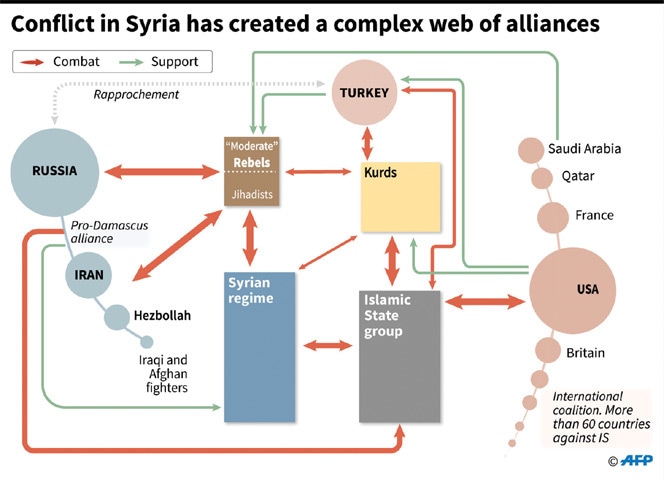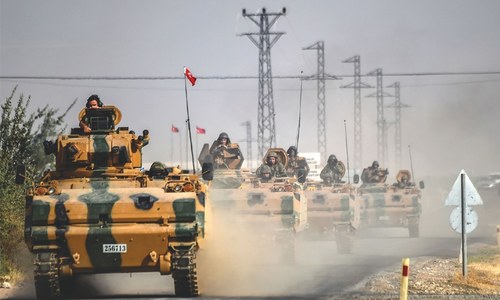
BEIRUT: Syria’s conflict broke out in March 2011 with peaceful protests against President Bashar al-Assad’s government but has evolved into a complex war involving jihadist groups and regional and international powers.
Over 290,000 people have been killed and more than half Syria’s population displaced in the conflict, which Turkey entered this week, dispatching troops to battle the militant Islamic State group and halt the advance of Kurdish forces.
Who is fighting who?
Regime against rebels: The main battle line pits the approximately 300,000 soldiers of the Syrian army, and allied forces, against myriad rebel groups and Syrian and foreign jihadists.
The largest anti-regime rebel alliance is the Army of Conquest, grouping Islamist factions like Ahrar al-Sham and Faylaq al-Sham with jihadists such as Fateh al-Sham Front, previously Al Qaeda affiliate Al-Nusra Front.
The biggest battlefront at present is Aleppo city, divided between government and opposition control but surrounded by loyalist forces.
The government is also fighting to retake control of Eastern Ghouta, next to Damascus, which is largely controlled by the Jaish al-Islam rebel group.
Regime against IS: Syria’s army has fought IS in several parts of the country, expelling the jihadists from the ancient city of Palmyra in March.
Regime against Kurds: Syria’s Kurds have largely stayed out of the conflict between the government and armed opposition, but in August regime aircraft bombed Kurdish forces for the first time in Hasakeh, a city jointly controlled by the regime and Kurds.
Kurdish forces now hold 90 per cent of Hasakeh.
Kurds against IS: Syria’s Kurds have carved out a semi-autonomous region in north and northeastern Syria, with their People’s Protection Units (YPG) becoming a key partner of the US-led coalition fighting IS.
Since January 2015, the YPG has ousted IS from the key towns of Kobane and Manbij in Aleppo province, Tal Abyad in Raqa province, and large parts of Hasakeh province.
The YPG is also the key component of the Syrian Democratic Forces (SDF), which groups diverse factions battling IS.
IS against rebels: IS considers all those who fail to pledge allegiance to its leader Abu Bakr al-Baghdadi its foes and has battled rebel groups and even rival jihadists.
Rebels backed by Turkey participated in this week’s capture of the border town of Jarabulus from IS.
Who supports whom?
Regime: The army is bolstered by 200,000 irregular forces, notably from the National Defence Forces. It also fights alongside between 5,000-8,000 forces from Lebanon’s powerful Shia militia Hezbollah, as well as Iranian, Iraqi and Afghan fighters.
Russia, a key regime backer, began an aerial campaign in support of Assad’s government last September and has helped Damascus recapture areas in several provinces.
Iran is another key ally, providing financial and military support.
Rebels: Opposition factions deemed “moderate” are backed by the West, particularly the United States, France and the UK, though the forces have accused their supporters of providing insufficient support.
Turkey, Saudi Arabia and Qatar also back the opposition, and they have also lent support to Islamist factions.
Kurds: Syria’s Kurds are key partners of the anti-IS coalition headed by Washington, but Turkey considers the YPG to be a branch of the Kurdistan Workers’ Party (PKK), which Ankara brands a “terror” group.
Jihadists: No country openly backs the jihadists of Fateh al-Sham and IS, although the latter has been able to rely on funds from taxation and resources in the territory it holds in Syria and Iraq.
Who controls what?
Regime: Syria’s government holds around 35 per cent of the country, including strategic areas such as the capital Damascus, central Homs and Hama, the coast, and large parts of Aleppo. Sixty per cent of the population lives under its rule.
IS: Despite setbacks since 2015, IS controls around 35pc of Syria, much of it uninhabited. It dominates Deir Ezzor province on the Iraqi border and Raqa province. It is also present in a number of other regions.
Kurds: Kurdish forces hold around 18pc of the country, including three-quarters of the Syrian-Turkish border. They have declared a federal region in areas under their control.
Fateh al-Sham, other rebels: Fateh al-Sham and other rebel forces hold some 12pc of the country.
The largest expanse is in Idlib province and controlled by the Army of Conquest alliance.
What are goals of each party?
Regime: President Assad has said he wants to retake the whole country and will not stand down.
Rebels: Rebel forces seek to oust Assad, though factions differ on their vision for the country, with Fateh al-Sham aspiring to an Islamic emirate.
Kurds: The Kurds seek an autonomous region in areas where they form a majority.
IS: IS seeks to expand its self-proclaimed “caliphate” in territory under its control in Syria and Iraq.
United States: Washington has called on Assad to step down, but its efforts are now focused on combating IS.
Russia: Moscow insists Assad will not be ousted, and seeks a diplomatic victory by competing with Washington to shape negotiations between the regime and rebels.
Iran: Tehran seeks to protect key ally Assad, and assert its role in the Arab world.
Turkey: Ankara backs the opposition, but is currently focused on preventing the Kurds from creating a contiguous autonomous region.
Published in Dawn, August 27th, 2016


































